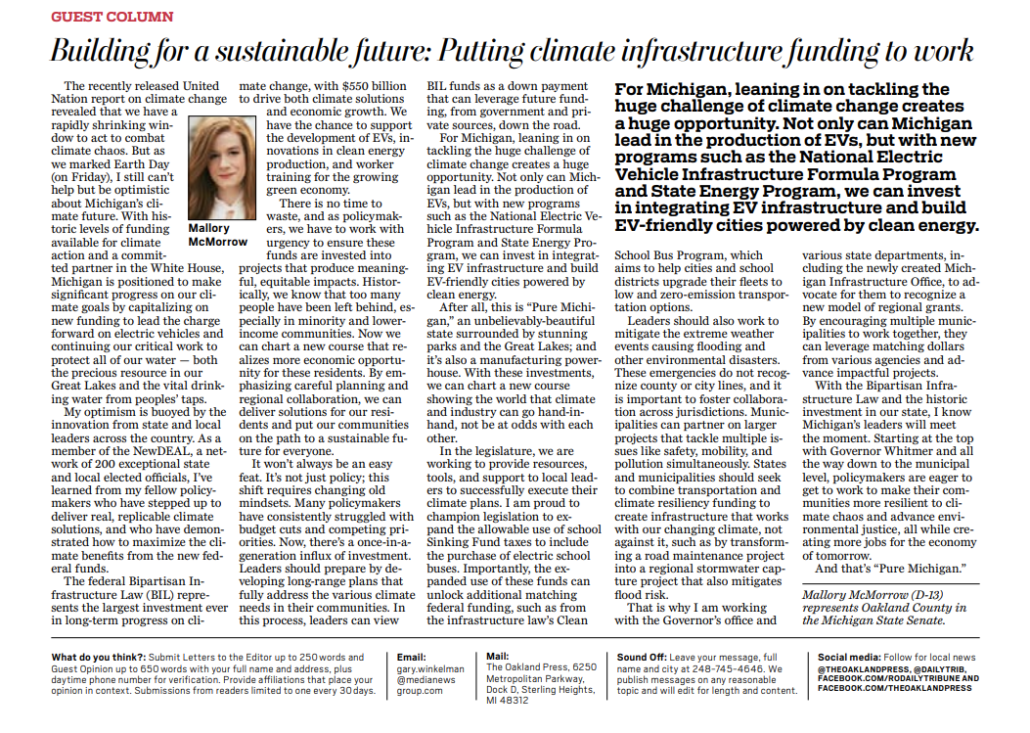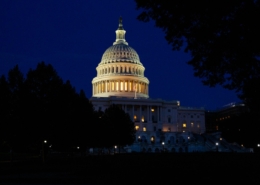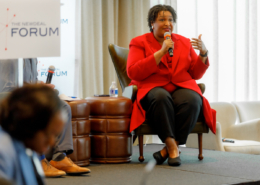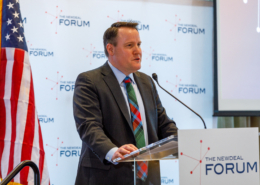By Senator Mallory McMorrow
Published by the Oakland Press, April 24, 2022
The recently released United Nation report on climate change revealed that we have a rapidly- shrinking window to act to combat climate chaos. But as we mark Earth Day this year, I still can’t help but be optimistic about Michigan’s climate future. With historic levels of funding available for climate action and a committed partner in the White House, Michigan is positioned to make significant progress on our climate goals by capitalizing on new funding to lead the charge forward on electric vehicles and continuing our critical work to protect all of our water – both the precious resource in our Great Lakes and the vital drinking water from peoples’ taps.
My optimism is buoyed by the innovation from state and local leaders across the country. As a member of the NewDEAL, a network of 200 exceptional state and local elected officials, I’ve learned from my fellow policymakers who have stepped up to deliver real, replicable climate solutions, and who have demonstrated how to maximize the climate benefits from the new federal funds.
The federal Bipartisan Infrastructure Law (BIL) represents the largest investment ever in long-term progress on climate change, with $550 billion to drive both climate solutions and economic growth. We have the chance to support the development of EVs, innovations in clean energy production, and worker training for the growing green economy.
There is no time to waste, and as policymakers, we have to work with urgency to ensure these funds are invested into projects that produce meaningful, equitable impacts. Historically, we know that too many people have been left behind, especially in minority and lower-income communities. Now we can chart a new course that realizes more economic opportunity for these residents. By emphasizing careful planning and regional collaboration, we can deliver solutions for our residents and put our communities on the path to a sustainable future for everyone.
It won’t always be an easy feat. It’s not just policy; this shift requires changing old mindsets. Many policymakers have consistently struggled with budget cuts and competing priorities. Now, there’s a once-in-a-generation influx of investment. Leaders should prepare by developing long-range plans that fully address the various climate needs in their communities. In this process, leaders can view BIL funds as a down payment that can leverage future funding, from government and private sources, down the road.
For Michigan, leaning in on tackling the huge challenge of climate change creates a huge opportunity. Not only can Michigan lead in the production of EVs, but with new programs such as the National Electric Vehicle Infrastructure Formula Program and State Energy Program, we can invest in integrating EV infrastructure and build EV-friendly cities powered by clean energy.
After all, this is “Pure Michigan,” an unbelievably-beautiful state surrounded by stunning parks and the Great Lakes; and it’s also a manufacturing powerhouse. With these investments, we can chart a new course showing the world that climate and industry can go hand-in-hand, not be at odds with each other.
In the legislature, we are working to provide resources, tools, and support to local leaders to successfully execute their climate plans. I am proud to champion legislation to expand the allowable use of school Sinking Fund taxes to include the purchase of electric school buses. Importantly, the expanded use of these funds can unlock additional matching federal funding, such as from the infrastructure law’s Clean School Bus Program, which aims to help cities and school districts upgrade their fleets to low and zero-emission transportation options.
Leaders should also work to mitigate the extreme weather events causing flooding and other environmental disasters. These emergencies do not recognize county or city lines, and it is important to foster collaboration across jurisdictions. Municipalities can partner on larger projects that tackle multiple issues like safety, mobility, and pollution simultaneously. States and municipalities should seek to combine transportation and climate resiliency funding to create infrastructure that works with our changing climate, not against it, such as by transforming a road maintenance project into a regional stormwater capture project that also mitigates flood risk.
That is why I am working with the Governor’s office and various state departments, including the newly created Michigan Infrastructure Office, to advocate for them to recognize a new model of regional grants. By encouraging multiple municipalities to work together, they can leverage matching dollars from various agencies and advance impactful projects.
With the Bipartisan Infrastructure Law and the historic investment in our state, I know Michigan’s leaders will meet the moment. Starting at the top with Governor Whitmer and all the way down to the municipal level, policymakers are eager to get to work to make their communities more resilient to climate chaos and advance environmental justice, all while creating more jobs for the economy of tomorrow.
And that’s “Pure Michigan.”
Mallory McMorrow (D-13) represents Oakland County in the Michigan State Senate









